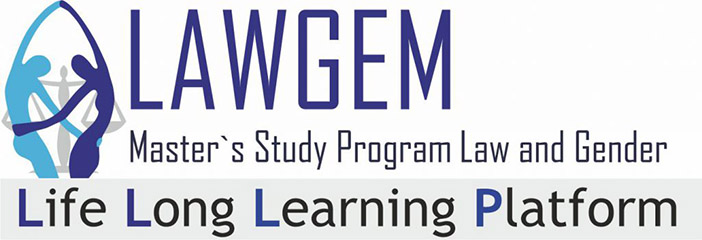Faculty of Law University of Belgrade in the cooperation with the OSCE Mission to Serbia organized the Spring School/Pilot Master – Law and Gender. This Spring School was based on the project LAWGEM and served as a kind of the pilot practicing of the future master`s study program Law and Gender. It covered all courses contained in this master`s study program curriculum, and the reading materials consisted to a great extent of the books published within the LAWGEM project. The School was organized in a hybrid form – in person at the Faculty of Law University of Belgrade and online, with 69 participants (students of undergraduate, master and PhD level), both from Serbia and other countries around the world (Albania, Belarus, Bosnia and Herzegovina, Brazil, China, Croatia, France, Germany, India, Iran, Italy, Montenegro, Russia and Vietnam). It is certain that participants of this School have gained valuable knowledge which will help them on their academic path and in their professional careers. On the other hand, the Spring School represented an excellent preparation of lectures and pedagogic experiences of the scholars from the University of Belgrade Faculty of Law for the future conducting the master’s study program Law and Gender.
he mandatory course Feminist Political and Legal Theories started with a lecture by Professor Dr. Dragica Vujadinović focusing on the feminist reconsideration of political and legal theories and relevant concepts. In this regard, Professor has in detail explained how patriarchy has shaped our history, while focusing on the dialectic of patriarchy and emancipation in modern and contemporary epoch. Such dialectic today exists within all spheres of life – starting from the individual personal and family life, including all domains of the public life of the individuals, social groups and institutions, as well as all spheres of knowledge and the political and legal thought. Even though times have changed, we can often encounter the lack of gender-sensitive approach in political mainstream theories. Namely, contemporary political thinkers, including those who have been dealing with theories of human rights and constitutional democracy, follow the track of the dominant legacy/the mainstream thought. So, it happens that the mentioned progressive contemporary theories with their critical thinking against different inequalities, injustices, paradoxically stand uncritical, non-reflexive towards gender inequalities and an importance of gender issue. In relation to the mentioned, Professor Dr. Vujadinović has also focused on the feminist critique of the 2nd and 3rd wave of feminism and the feminist reconsidering of the political and legal domain. Also, Professor addressed the issue of interplay of old and new concepts and the new meanings of the “old” political concepts. Finally, special attention was dedicated to the issue of substantive equality as a goal and the steps for achieving substantive equality in legal theory and practice.
Lectures of Professor Dr. Miodrag Jovanović and Assoc. Professor Dr. Bojan Spaić also were part of the mandatory course “Feminist Political and Legal Theories”. Prof. Dr. Jovanović’s lecture “Gender (and) Law as a Branch of Law?” initiated lively discussion about the most suitable way for drawing a link between gender and law, as well as about the question whose task it is to form a new legal branch. In that sense, Professor Dr. Jovanović referred to the issue of understanding the difference between “law on gender” and “law and gender”, followed by a broader reflection on why characterization matters. In relation to the mentioned, Professor addressed the question of whose task is to acknowledge the status of a specialized disciplinary field referring to the state, law faculties and legal science as potential answers. In this regard, Professor also referred to systematization provided by Professor Dr. Lukić. Finally, based on the everything mentioned, it was concluded that studies in ‘gender (and) law’ are in a peculiar disciplinary state of flux and that while there is enough raw legal material within the Serbian legal system to work with, no circle of lawyers who would think of themselves as ‘gender lawyers’ has emerged so far.
Assoc. Prof. Dr. Spaić discussed “Feminist Legal Theories” by providing an overview of both the insider and outsider jurisprudence and critical legal studies, emphasizing differences between liberal, radical, and intersectional feminist movements and sharing the inspiring story of Lidia Poët, the first Italian female lawyer. Further on, Professor has focused on the differences between liberal, radical and intersectional feminism, while discussing with the participants what would the approach taken in each of the mentioned reflect on the situation of Lidia Poët. In that way, the lecture focused on both the positive, but also the negative sides of each approach and idea. What is certain, and what the lecture was concluded with, is that today, there is still something to fight for (and fight against). Namely, the conclusions of the lecture are as follows: feminism has put a strong emphasis on inequality based on certain criteria; there is some formal inequality that is reinforced by the written law; other inequalities are maintained by legal arrangements that make achieving substantial equality between men and women impossible or improbable; it is a permanent moral task of the law to reduce these remaining inequalities.
Feminist Political and Legal Theories 1: Feminist Reconsideration of Political Theories
Feminist Political and Legal Theories 2: Gender (and) Law as a Branch of Law?
Feminist Political and Legal Theories 3: Feminist Legal Theories

